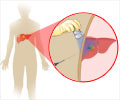- New anti-cancer protein LHPP (phospholysine phosphohistidine inorganic pyrophosphate phosphatase) identified, that could be a potential biomarker for liver cancer
- Complete loss of LHPP from tumor cells is associated with lower survival rates and unfavorable patient prognosis
- Incidence of liver (hepatocellular) cancer has almost doubled over the last 20 years in Switzerland
Details of the Study
- The team created a mouse model for hepatocellular carcinoma by activating mTOR (mammalian target of rapamycin) signaling, specifically in the liver. Activation of this pathway is known to promote development of cancer.
- The scientists then analyzed more than 4,000 proteins in total, comparing their concentrations in healthy versus tumor tissue.
- One particular enzyme emerged as the hot favorite: the histidine phosphatase, LHPP. This protein while present in normal healthy tissue was completely absent in cancer cells "It is striking that LHPP is present in healthy tissue and completely absent in tumor tissue," says first author Sravanth Hindupur.
- Re-introducing the genetic information for production of LHPP by the cells prevents the development of tumors and maintains liver function.
- Similar to what was noted in the mouse model, there was a marked reduction/absence of LHPP levels in patients with liver cancer. Additionally, both disease severity and life expectancy correlated with LHPP levels.
- In patients with complete loss of this anti-cancer protein, they died on average two years earlier. Thus LHPP proves to be useful as a biomarker to classify tumors.
How LHPP Protein Acts As Tumor Suppressor
- A basic point to understand is that phosphorylation of proteins is important in cancer formation.
- LHPP is a phosphatase (enzyme) that removes histidine-linked phosphate groups from proteins (dephosphorylation), thus keeping cancer from forming i.e tumor suppressor. Like all amino acids, histidine is a basic component of proteins.
- When LHPP protein is absent, overall protein histidine phosphorylation is increased, which can leadto activation of several important pathways and uncontrolled cell proliferation.
- Similarly LHPP may also have a role in the development of other tumors which needs to be investigated
In conclusion, the identification of this new anti-cancer protein may pave the way for further research to understand the mechanism of action and role of histidine phosphorylated proteins in tumorogenesis and find potential clinical applications in cancer treatment.
About Hepatocellular Carcinoma
Hepatocellular cancer is the most common (90%) form of primary liver cancer. The incidence has been found to be rising in many developed nations and is likely to continue rising. Most patients have underlying chronic liver disease.Liver cancer can be diagnosed by means of CT or MRI scans and elevated levels of serum alpha fetoprotein. In some cases liver biopsy may be necessary to confirm diagnosis.
Surgical removal of tumor, liver transplantation and radiofrequency or ethanol injection ablation are now standard therapies for early-stage disease. With these treatments, five year survival rates vary between 50% and 70%.
High levels of alpha fetoprotein have been found to be associated with an unfavorable prognosis.
References:
- Recombinant Mouse Phospholysine phosphohistidine inorganic pyrophosphate phosphatase(Lhpp),Mammalian cell - (https://www.cusabio.com/Recombinant-Protein/Recombinant-Mouse-Phospholysine-phosphohistidine-inorganic-pyrophosphate-phospha-Mammalian-cell-12505310.html)
- Primary Liver Cancer - (https://patient.info/doctor/primary-liver-cancer-pro)














